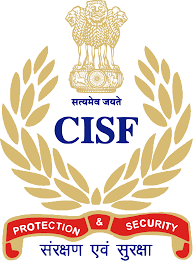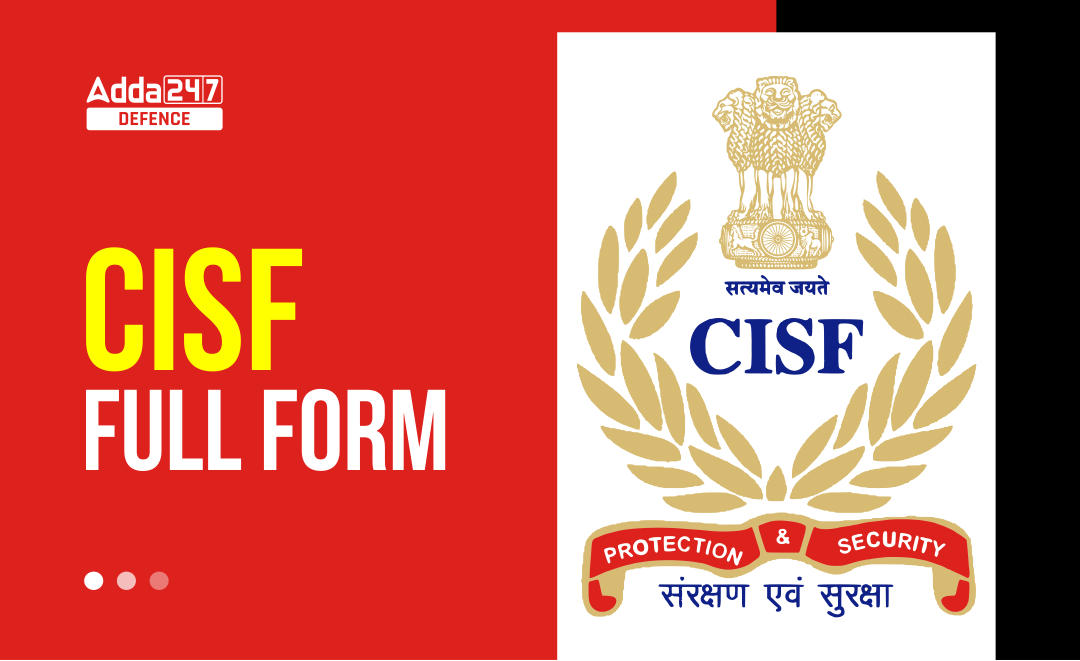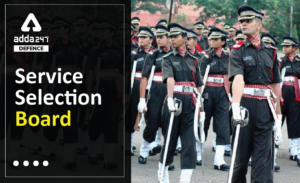The Central Industrial Security Force (CISF) is an armed force of the Government of India, established in 1969 to provide security to various public sector undertakings (PSUs) and critical infrastructure installations. Its primary role is to ensure the safety and security of vital installations such as nuclear power plants, airports, and public sector industries. CISF manages security at major airports across India, ensuring passenger safety and compliance with regulations. In today’s article, we have given complete information about CISF Full Form, Motto, History and Major Branches and Sectors of CISF
CISF Full Form
The full form of CISF is Central Industrial Security Force, and if you are a CISF aspirant then you need to know about CISF full form, history, motto and branches and major areas. CISF oversees security operations at major airports across India, ensuring both passenger safety and regulatory compliance. Beyond airport security, it offers protection to designated individuals and VIPs, plays a key role in disaster response during emergencies, and aids in maintaining law and order at public events. CISF personnel receive specialized training in areas like disaster management, fire safety, and advanced security protocols, making them a crucial component of India’s overall security infrastructure.
CISF Motto
The CISF Motto is “Protection and Security” and since the day of its formation the force is pragmatically and efficiently carrying out its duty and is ready to meet the new challenges in future on account of its sheer character and bravery. The CISF motto reflects the commitment of the force towards providing excellent security and safety services to the nation and its people, while remaining loyal and dedicated to their duty.

CISF History
The Central Industrial Security Force (CISF) was established in 1969 to provide security to important government and industrial installations. In 1983, it became part of the armed forces under a legislative Act. CISF has expanded over time and developed into a versatile security force with specialized training and skills. The Central Industrial Security Force (CISF) was established in 1969 to provide integrated security for sensitive public sector undertakings. CISF is a multi-skilled organization with over 188,000 personnel, currently offering security coverage to 359 establishments across the country. The CISF also operates its own Fire Wing, which serves 115 of these sites.
CISF Organization
CISF’s security umbrella encompasses some of India’s most critical infrastructure, including nuclear installations, space establishments, airports, seaports, and power plants. It also protects important government buildings, iconic heritage monuments, the Delhi Metro, the Parliament House Complex, and central jails in Jammu and Kashmir. Additionally, the force features a specialized VIP Security unit that provides round-the-clock protection for high-profile individuals.
- Airport
- North
- North-East
- East
- West
- South
- Training
- South-East
- Central) along with a Fire Service Wing.
Being a central Indian police agency and having high presence of Indian Police Service officers, CISF follows ranks and insignia similar to other police organizations in India.
Major Branches and Sectors of CISF
CISF’s security umbrella encompasses some of India’s most critical infrastructure, including nuclear installations, space establishments, airports, seaports, and power plants. It also protects important government buildings, iconic heritage monuments, the Delhi Metro, the Parliament House Complex, and central jails in Jammu and Kashmir. Additionally, the force features a specialized VIP Security unit that provides round-the-clock protection for high-profile individuals.
The CISF is structured into three primary branches:
- The Executive Office
- The Fire Service Divisions
- The Ministry Division
Furthermore, the CISF is organized into six distinct sectors, each overseen by an Inspector General. These sectors, along with their respective headquarters, are as follows:
- Eastern Sector – Headquartered in Patna.
- Western Sector – Headquartered in Mumbai.
- Northern Sector – Headquartered in New Delhi.
- Southern Sector – Headquartered in Chennai.
- North Eastern Sector – Headquartered in Kolkata.
- Airport Sector – Headquartered in New Delhi.
This organizational framework helps the CISF efficiently manage its diverse responsibilities across various sectors and industries.
CISF Functions
The CISF provides security for some of India’s most critical infrastructure, including nuclear installations, space establishments, airports, seaports, and power plants. The force also has a specialized VIP Security unit that offers round-the-clock protection for high-profile individuals.
- Expanded Mandate: Following the Mumbai terror attacks in November 2008, CISF’s responsibilities were broadened to include security for private corporate establishments.
- Security Consultancy: The force now offers in-demand security consultancy services to private entities.
- High Standards: CISF is committed to maintaining high standards in personnel professionalism and adopting cutting-edge technology to enhance security measures.
- Effective Response: The force is well-equipped to respond to various security threats, including terrorism, and continuously evolves to adapt to the changing security landscape.
- Public Interaction: As the only Central Armed Police Force with daily public interactions (at airports, the Delhi Metro, and iconic monuments), CISF balances rigorous security procedures with a friendly, people-centric approach.
Continuous Improvement: The organization is dedicated to upgrading its professional skills and welcomes feedback from the public and clients to enhance its services.
Areas of Responsibility
The Central Industrial Security Force works for the given areas of responsibility.
Critical Infrastructure: Provides security for vital installations, including:
- Nuclear installations
- Space establishments
- Airports
- Seaports
- Power plants
Government Protection: Safeguards important government buildings, such as:
- Iconic heritage monuments
- The Delhi Metro
- The Parliament House Complex
- Central jails in Jammu and Kashmir
VIP Security: Maintains a specialized VIP Security unit offering round-the-clock protection for high-profile individuals.
| Responsibilities of CISF | Description |
|---|---|
| Providing security to vital installations | Airports, seaports, power plants, oil refineries, and government buildings. |
| Primary Purpose |
Its main purpose is to provide security to industrial units and critical facilities, such as nuclear power plants, currency note pressings and power plants. |
| Disaster management and rescue operations | Fire Wing for handling fire and rescue operations; involvement in disaster management and relief efforts. |
| Crowd control and VIP security | Managing crowd control during events and festivals; providing security to VIPs and their families. |
| Protection of cultural heritage | Ensuring the protection of cultural heritage sites, including historical monuments and archaeological sites. |
| Contribution to Defence Sector |
CISF provides security to vital government and private defence sectors, thereby strengthening the economic and national security of the country. |
| Training and development | to enhance personnel capabilities and keep them updated with the latest techniques and technologies. |
| International assignments | Providing security and protection to Indian embassies and consulates abroad |
CISF Eligibility Criteria
The CISF releases huge number of opportunities for candidates every year. Those who wish to join the CISF can check the eligibility Criteria for CISF and other key details.
| Eligibility Criteria | Requirements |
|---|---|
| Age | Must be between 18 and 23 years old. |
| Nationality | Must be Indian. |
| Educational Qualifications | Must have completed 12th grade with Science as a subject by the application deadline. |
| Number of Attempts | No limit to the number of attempts. |
| Experience | No prior experience required. |
| Additional Points | Educational requirements must be fulfilled by the application deadline. |
| Candidates must meet the minimum physical requirements for height and chest girth. |
Important Facts About CISF
CISF acts as an important force in India. Let’s know some of the important facts about CISF that all the candidates must know to have a better knowledge about CISF.
- CISF was established in 1969 by an Act of the Indian Parliament.
- Its primary role is to safeguard industrial sites and critical infrastructure such as nuclear power plants, currency printing facilities, and power stations.
- CISF provides advisory services to key government and business organizations.
- Some of its advisory clients include NBRI, TISCO, Orissa Mining Co, and IB Thermal Power Plant.
- CISF is the largest paramilitary force in India with over 1.63 lakh personnel.
- It offers security to various public sector undertakings, airports, seaports, and other significant installations.
- CISF has been instrumental in disaster management during natural calamities.
- It has a notable history of bravery and has received numerous gallantry awards.
CISF Salary
The salary of a CISF officer depends on their rank and experience, and the figures given represent an approximate pay structure.
| Rank | Pay Range |
|---|---|
| Assistant Commander | Rs. 56,100 to Rs. 1,77,500 per month |
| Deputy Commander | Rs. 67,700 to Rs. 2,08,700 per month |
| Constable/Tradesman | Rs. 78,800 to Rs. 2,09,200 per month |
| Deputy Chief of Staff | Rs. 1,31,100 to Rs. 2,16,600 per month |
| Inspector General (IG) | Rs. 1,44,200 to Rs. 2,18,200 per month |
CISF Departments and Areas
The Central Industrial Security Force (CISF) has three main branches, each with specific roles:
- Executive Office: Manages security operations and measures.
- Fire Service Divisions: Handles fire prevention, management, and rescue services.
- Ministry Division: Works closely with the Ministry of Home Affairs on security matters.
Overall, the CISF plays a crucial role in ensuring the safety and security of important establishments and infrastructure projects in India. The force has a reputation for providing excellent security services and is considered to be one of the most competent security forces in the world.
CISF Rank Structure
The CISF recruit at positions in various Groups A, B, C Etc. Here is the rank structure for CISF divided on the basis of Officer and Non Officers Ranks
| Officer Rank under CISF |
| Director General |
| Special Director General |
| Additional Director General |
| Inspector General |
| Deputy Inspector General |
| Senior Commandant |
| Commandant |
| Deputy Commandant |
| Assistant Commandant |
Ranks of Non Commissioned Officers in the CISF
| Non Commissioned Ranks in CISF |
| Inspector |
| Sub Inspector |
| Assistant Sub Inspector |
| Head Constable |
| Constable |
| Related Articles | |
| CISF Fireman Recruitment 2024 | CISF fireman Syllabus |
| CISF Fireman Previous Year Question | CISF fireman Salary |



 CRPF Full Form, History, Roles and Respo...
CRPF Full Form, History, Roles and Respo...
 NCC Full Form, Know About History and Ai...
NCC Full Form, Know About History and Ai...
 SSB Full Form, You All Need to Know Abou...
SSB Full Form, You All Need to Know Abou...
